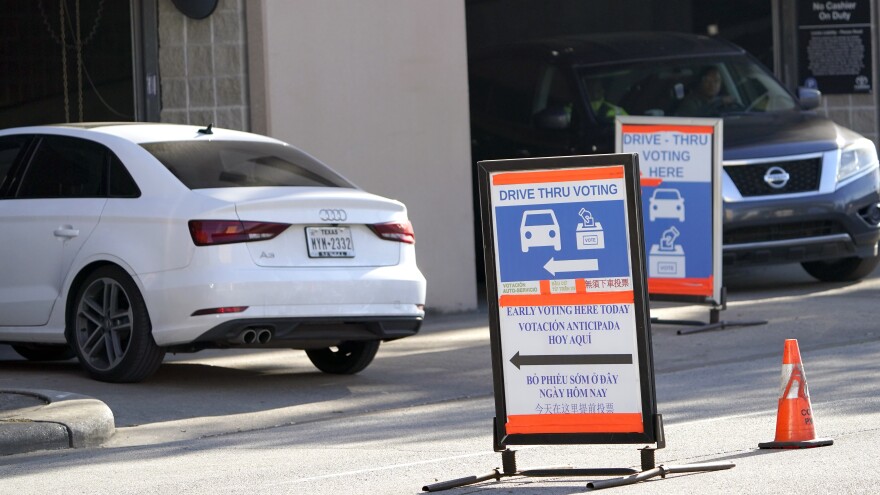Last year, when Isabel Longoria had to figure out how to safely hold an election during a pandemic, she saw the daunting task as an opportunity to do things differently.
"I just started dreaming," says Longoria, the elections administrator for Harris County in Texas. "And I just said, 'OK, let's start from the beginning 鈥� not with what's possible first 鈥� but what do voters want, and what's going to make it safer?' "
Harris County is home to Houston, and is one of the most populous and diverse areas of the country. Longoria says figuring out how to make polling locations less crowded was a main focus in the leadup to the 2020 elections, but she had always wanted to make voting easier as well.
One of her solutions was to increase the hours that voting centers were open. Some polling locations were. Longoria says being open late at night gave shift workers 鈥� including first responders 鈥� more opportunities to vote. She says it also "spread out the number of people voting at any time" at a location.
Longoria also looked to local businesses, which were shifting to curbside options for their customers. She came up with drive-thru voting.
"Most folks who are fortunate to have a car use it to do all sorts of things 鈥� banking, grocery shopping," she says. "What makes voting different? In my opinion, nothing."
Longoria and her team also tried to make mail voting easier by sending out ballot applications to all eligible voters, in case people didn't know they had that option.
But Republican leaders in Texas say all of these efforts were an .
During a recent news conference, Gov. Greg Abbott argued that local election officials 鈥� including those in Harris County 鈥� were doing things not explicitly allowed by law. He also accused them of effectively opening the door to voter fraud.
"Whether it's the unauthorized expansion of mail-in ballots or the unauthorized expansion of drive-thru voting," Abbott says, "we must pass laws to prevent election officials from jeopardizing the election process."
In response to those local efforts, Republicans who control the state legislature filed a series of restrictive voting bills. said "Texas is the state with the most restrictive voting processes," but it's likely its laws will become stricter.
One measure that's been proposed would make distributing ballot applications to voters who didn't ask for one a felony. Others would outlaw drive thru-voting, and not allow polling locations to be open 鈥� specifically beyond 7 a.m. to 7 p.m. Another would require that election administrators put in every one of their polling sites, no matter what.
That last one makes no sense to Chris Davis, the election administrator in Williamson County, a swing county in central Texas.
"If you have a smaller-size room in one part of your county that can only fit eight [voting machines]," he says, "well, by golly, eight is as many as you can have in an arena, or a lecture hall or high school gym."
Davis says the proposed changes to how local officials run elections are "incredibly short-sighted" and could lead to a misuse of public resources. And he also takes issue with proposals that would allow people in polling locations and ballot counting sites. He says that creates election security concerns.
But mostly Davis says he feels like lawmakers are accusing election administrators of doing bad things, which he says just isn't true.
"We contend that this isn't based in reality," he says. "It's a perception brought on by very, very visible candidates. And that perception has taken on a life of its own."
Committees in the Texas House and Senate began hearing two of the most notable Republican voting bills this week 鈥� including House Bill 6 and Senate Bill 7.
Texas Democrats have raised concerns that certain bills would make running elections harder because of the fear of prosecution looming over many possible mistakes.
Harris County's Longoria says the reaction from state leaders has been disappointing because she was successful in getting more people to vote while also limiting the potential spread of the coronavirus. Turnout in Harris County hit about a 30-year high in 2020.
"We were really proud," she says.
Longoria, as well as voting rights advocates in Texas, are also worried these voting bills could make it harder for marginalized communities to vote. Longoria says it's difficult to disregard the role of race in this effort as lawmakers zero in on things like drive-thru voting.
"One hundred twenty-seven thousand voters did drive-thru voting 鈥� the majority of which were Black and brown voters," she says. "It's hard to not draw a line and say, 'Why are you going after this innovation?' "
Copyright 2021



